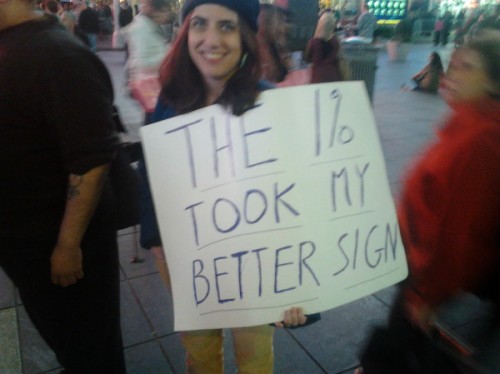
I don’t know about you but I’ve had protesters occupying my mind, off and on, for over 30 years now. YOU’LL NEVER HAVE A CAREER…YOU’RE NOT THAT SMART…YOU BETTER GET SOBER… SHE’S NEVER GOING TO LOVE YOU… THE PAIN WILL END IF YOU END. Those are the kinds of homemade signs I see, the sort of slogans I hear. Candy corn anyone? Maybe a hug?
I’m continually reminded that I need something bigger than me to sort out my life, to show me the path. Last week, I suddenly found myself getting choked up when a certain infamous trial in Italy came to a close. The moment the young lady in question realizes the judge is setting her free, she breaks. And I broke with her. Not because I’m sure of Amanda Knox’s guilt or innocence (I hadn’t been following it at all), but because I’m 100 percent sure I’m ultimately guilty; and I need someone to tell me everyday, as The Who sings: you are forgiven.
My friend, and Mockingbird’s own, Ethan Richardson recently gave me a collection of essays from Southern writer Wendell Berry, The Gift of Good Land. They’re from the late 70’s/early 80’s and, in this passage, touch on the following question: if I can’t change myself, then how can I expect you to change? Regardless of where you stand on the latest protests and criminal trials, it’s compelling stuff.
p.s. I did get sober about 2 1/2 years ago, but it was a giant gift that I never saw coming. Go figure. Now on to Mr. Berry…
An even greater danger is that of moral oversimplification, or self-righteousness. Protests, demonstrations, and other forms of “movement” behavior tend to divide people into the ancient categories of “us” and “them.” In the midst of the hard work and the risks of opposing what “we” see as public danger, it is easy to assume that if only “they” were as clear eyed, alert, virtuous, and brave as “we” are, our problems would soon be solved. This notion too is patently false. In the argument over nuclear power – as in most public arguments – the division between “us” and “them” does not really exist. In our efforts to correct the way things are, we are almost always, almost inevitably, opposing what is wrong with ourselves. If we do not see that, then I think we won’t find any of the solutions we are looking for.
For example, I believe that most people who took part in the June 3 demonstration at Marble Hill [nuclear power plant] got there in an automobile. I did, and I could hardly have got there any other way. Thus the demonstration, while it pushed for a solution to one aspect of the energy problem, was itself another aspect of the energy problem.
And I would be much surprised to learn that most of us did not return home to houses furnished with electric light switches, which we flipped on more or less thoughtlessly, not worrying overmuch about the watersheds that are being degraded or destroyed by strip mines to produce the coal to run the power plants to make the electricity that burns in our light bulbs. I know, anyhow, that I often flip on my own light switches without any such worries.
Nearly all of us are sponsoring or helping to cause the ills we would like to cure. Nearly all of us have what I can only call cheap-energy minds; we continue to assume, or to act as if we assume, that it does not matter how much energy we use.
I do not mean to imply that I know how to solve the problems of the automobile or of the wasteful modern household. Those problems are enormously difficult, and their difficulty suggests their extreme urgency and importance. But I am fairly certain that they won’t be solved simply by public protests. The roots of the problems are private or personal, and the roots of the solutions will be private or personal too. Public protests are incomplete actions; they speak to the problem and not to the solution.
Protests are incomplete, I think, because they are by definition negative. You cannot protest for anything. The positive that a protest is supposed to do is “raise consciousness” but it can raise consciousness only to the level of the protest.
So far as protest itself is concerned, the raised consciousness is on its own. It appears to be possible to “raise” your consciousness without changing it- and so to keep protesting forever.
The Gift of Good Land, pgs. 164-165

COMMENTS
Leave a Reply















